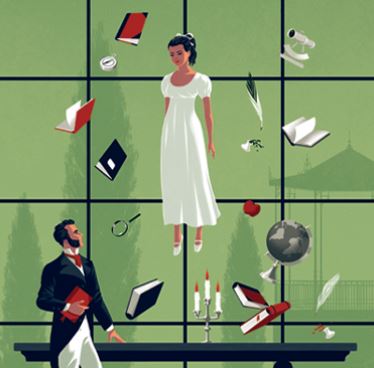Arcadia
Rice Pudding, Lord Byron, and Tortoises
Arcadia
by Tom Stoppard
The Questors at the Judi Dench Playhouse, Ealing until 10th June
Review by Andrew Lawston
Past and present collide, complement, and inform each other in an assured new production of Tom Stoppard’s Arcadia at Questors Theatre in Ealing.
In 1809, Septimus Hodge attempts to tutor Thomasina Coverly, deflecting her uncomfortable questions about “carnal knowledge” to the mathematical conundrum of Fermat’s Last Theorem. It emerges that Thomasina has heard of “carnal knowledge” via gossip concerning Septimus’s dalliances with another guest at Sidley Park, Mrs Chater.
The poet Ezra Chater arrives, challenging Septimus to a duel. Septimus outfoxes the poet smoothly by praising his new book, resulting in the poet signing the tutor’s advance copy.
Suddenly, the action moves to the present day Sidley Park, where the academic Bernard Nightingale clashes with the writer Hannah Jarvis as he seeks evidence while researching the truth behind Byron’s departure from England on the Grand Tour in 1809. Hannah is also a guest at Sidley Park, researching the life of a hermit who once lived in the grounds.
As key texts from the period emerge, Bernard becomes convinced that Byron left England after shooting Ezra Chater in a duel over two savage reviews of Chater’s work. Hannah and Valentine Coverly are unconvinced, and both continue their research.
Arcadia is notable for how many of its key characters never appear on-stage. Mrs Chater, who is the catalyst for most of the events in the play, never appears. Lord Byron also casts a long shadow over events in both 1809 and the present day, but the audience never sees him. In the present day, Lord and Lady Croom are referred to often, but also remain unseen.
The cast that do appear, however, do a wonderful job in this production. Alexandra Upton’s ingénue Thomasina Coverly sparkles with curiosity and intelligence, and great comic timing in her exchanges with Septimus. Oscar Gill’s Septimus Hodge is a delight of a part, drily witty and sophisticated, and Gill carries him off with great aplomb. He works extremely well with all the 1809 characters, including Lydia King’s splendid matriarch Lady Croom, John Barron’s blustering Captain Brice, but especially Tony Sears as the ridiculous amateur poet and amateur botanist Ezra Chater. The pair play off each other to great effect in two farcical confrontations where Septimus runs verbal rings around the poet.
Matthew Saldanha is great fun as the gossip-bearing servant Jellaby, and makes the part his own despite limited time on stage. Tim Pemberton similarly makes a great impression as the gardener Richard Noakes, who is attempting to persuade Lady Croom to allow him to convert the gardens of Sidley Park from classical landscaping to the then-popular Gothic style.
Meanwhile, in the present day, James Burgess is the perfect figure of a self-absorbed academic as Bernard Nightingale, being wonderfully rude to all around him, while still retaining the audience’s sympathy when things begin to go badly wrong for his grand theory. “I was on The One Show!” he protests, in one of several sly updates to the play’s text that keep the production feeling truly contemporary.
Sarah Sharpe’s Hannah Jarvis is Bernard’s primary foil, a contemporary writer whose book on Lady Caroline Lamb received a savage review from the academic. Both characters have to spend a considerable amount of time explaining history to the audience, which they pull off with great panache. The pair of them are guests at Sidley Park, where the present-day Coverlys still live. Valentine is played by Tom Redican – a frustrated mathematician analysing data on Sidley Park’s grouse through the “game books”, which eventually provide the academics with an essential clue, while he also becomes fascinated by Thomasina’s Nineteenth Century ideas on determinism and entropy.
Chloe Coverly is a fleeting presence played by Georgia Koronka, and her intellectual curiosity bears fascinating similarities to Thomasina’s. Georgia remains slightly aloof from the academic arguments, but has her own emotional journey which erupts towards the end of the play.
Finally Adam Batty bridges past and present by playing both modern Gus Coverly, and Nineteenth Century Augustus Coverly. He portrays the non-verbal Gus with great sensitivity, and shines equally as the more vocal Augustus.
Sidley Park is represented in both 1809 and the present day by a set whose foreground is a naturalistic study, complete with leather-bound books and a chaise longue, and a more expressionistic backdrop composed of pillars of books, with pages suspended from the ceiling. Bron Blake’s set looks wonderful under Tim Hayward’s lighting, and strikes a neat balance between the two distinct time periods, avoiding favouring either of them. This is particularly effective in the play’s final scene when characters from both timelines are on stage, dialogue skipping between them, though most of them are wearing period costume courtesy of costume designer Carla Evans.
Arcadia toys with tragedy, but ultimately feels like a highly intelligent comedy. It is a long play, and very wordy, but director Simon Rudkin ensures the pace never lapses, with the jumps between sidelines seamless and the cast absolutely on top of their dialogue. The science discussed, from the iterative equations that Thomasina pursues to try and describe natural forms, to the second law of thermodynamics and the “direction of heat” that comes to dominate discussions in the play’s second half, are weighty concepts, but presented so that audiences can grasp the ideas. It is a resoundingly successful production of a key play from one of our greatest living playwrights.
Andrew Lawston, June 2023
Image by Evelina Plonyte

